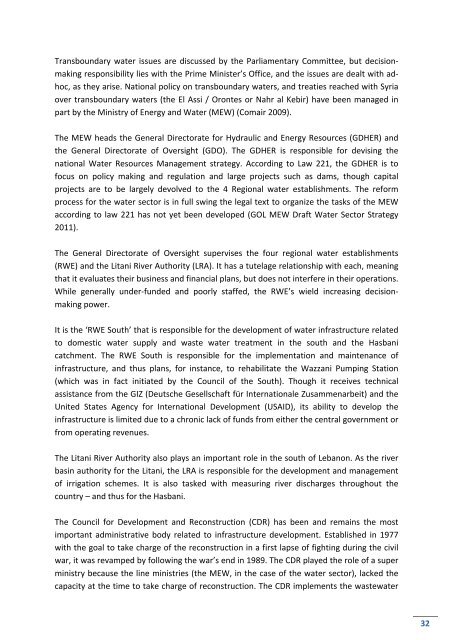Hydro-‐political Baseline of the Upper Jordan River - Ibrahim Abd El Al
Hydro-‐political Baseline of the Upper Jordan River - Ibrahim Abd El Al
Hydro-‐political Baseline of the Upper Jordan River - Ibrahim Abd El Al
Create successful ePaper yourself
Turn your PDF publications into a flip-book with our unique Google optimized e-Paper software.
Transboundary water issues are discussed by <strong>the</strong> Parliamentary Committee, but decision-‐<br />
making responsibility lies with <strong>the</strong> Prime Minister’s Office, and <strong>the</strong> issues are dealt with ad-‐<br />
hoc, as <strong>the</strong>y arise. National policy on transboundary waters, and treaties reached with Syria<br />
over transboundary waters (<strong>the</strong> <strong>El</strong> Assi / Orontes or Nahr al Kebir) have been managed in<br />
part by <strong>the</strong> Ministry <strong>of</strong> Energy and Water (MEW) (Comair 2009).<br />
The MEW heads <strong>the</strong> General Directorate for Hydraulic and Energy Resources (GDHER) and<br />
<strong>the</strong> General Directorate <strong>of</strong> Oversight (GDO). The GDHER is responsible for devising <strong>the</strong><br />
national Water Resources Management strategy. According to Law 221, <strong>the</strong> GDHER is to<br />
focus on policy making and regulation and large projects such as dams, though capital<br />
projects are to be largely devolved to <strong>the</strong> 4 Regional water establishments. The reform<br />
process for <strong>the</strong> water sector is in full swing <strong>the</strong> legal text to organize <strong>the</strong> tasks <strong>of</strong> <strong>the</strong> MEW<br />
according to law 221 has not yet been developed (GOL MEW Draft Water Sector Strategy<br />
2011).<br />
The General Directorate <strong>of</strong> Oversight supervises <strong>the</strong> four regional water establishments<br />
(RWE) and <strong>the</strong> Litani <strong>River</strong> Authority (LRA). It has a tutelage relationship with each, meaning<br />
that it evaluates <strong>the</strong>ir business and financial plans, but does not interfere in <strong>the</strong>ir operations.<br />
While generally under-‐funded and poorly staffed, <strong>the</strong> RWE’s wield increasing decision-‐<br />
making power.<br />
It is <strong>the</strong> ‘RWE South’ that is responsible for <strong>the</strong> development <strong>of</strong> water infrastructure related<br />
to domestic water supply and waste water treatment in <strong>the</strong> south and <strong>the</strong> Hasbani<br />
catchment. The RWE South is responsible for <strong>the</strong> implementation and maintenance <strong>of</strong><br />
infrastructure, and thus plans, for instance, to rehabilitate <strong>the</strong> Wazzani Pumping Station<br />
(which was in fact initiated by <strong>the</strong> Council <strong>of</strong> <strong>the</strong> South). Though it receives technical<br />
assistance from <strong>the</strong> GIZ (Deutsche Gesellschaft für Internationale Zusammenarbeit) and <strong>the</strong><br />
United States Agency for International Development (USAID), its ability to develop <strong>the</strong><br />
infrastructure is limited due to a chronic lack <strong>of</strong> funds from ei<strong>the</strong>r <strong>the</strong> central government or<br />
from operating revenues.<br />
The Litani <strong>River</strong> Authority also plays an important role in <strong>the</strong> south <strong>of</strong> Lebanon. As <strong>the</strong> river<br />
basin authority for <strong>the</strong> Litani, <strong>the</strong> LRA is responsible for <strong>the</strong> development and management<br />
<strong>of</strong> irrigation schemes. It is also tasked with measuring river discharges throughout <strong>the</strong><br />
country – and thus for <strong>the</strong> Hasbani.<br />
The Council for Development and Reconstruction (CDR) has been and remains <strong>the</strong> most<br />
important administrative body related to infrastructure development. Established in 1977<br />
with <strong>the</strong> goal to take charge <strong>of</strong> <strong>the</strong> reconstruction in a first lapse <strong>of</strong> fighting during <strong>the</strong> civil<br />
war, it was revamped by following <strong>the</strong> war’s end in 1989. The CDR played <strong>the</strong> role <strong>of</strong> a super<br />
ministry because <strong>the</strong> line ministries (<strong>the</strong> MEW, in <strong>the</strong> case <strong>of</strong> <strong>the</strong> water sector), lacked <strong>the</strong><br />
capacity at <strong>the</strong> time to take charge <strong>of</strong> reconstruction. The CDR implements <strong>the</strong> wastewater<br />
32


